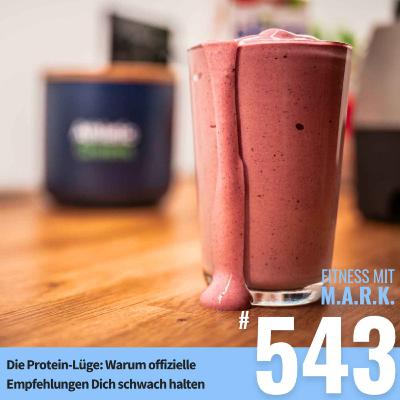Ernährungspläne lügen. Systeme nicht. Dein 90/10-Update für realen Fortschritt (#540)
Description
Starre Ernährungspläne sehen auf dem Papier gut aus, halten dem Kontakt mit dem "echten Leben" aber oft nicht stand. Am Ende dieser Folge weißt Du, wie Du trotzdem gewinnst.
Du erfährst, warum rigide Kontrolle oft zu Stress, Rückfällen und Jo-Jo-Effekt führt, während flexible Kontrolle nachweislich mit weniger Überessen, niedrigerem BMI und besserer Stimmung einhergeht.
Statt Verboten bekommst Du ein praxistaugliches System: 90/10-Prinzip, kleine Hebel für jede Mahlzeit und ein Umfeld, das Dich trägt, statt Deine Willenskraft zu verbrauchen.
Dabei gehen wir ganz praktisch vor. Es geht um Leitplanken, die Dir Freiheit geben und die zu Deinem Alltag passen, ohne Abwiegen und Tabellen.
Marks Ziel: Am Ende der Folge hast Du einen kompakten Werkzeugkasten in der Tasche, der Dir das Dranbleiben leicht(er) macht.
____________
*WERBUNG: Infos zum Werbepartner dieser Folge und allen weiteren Werbepartnern findest Du hier.
____________
- Das erwähnte „Buch-Geheimprojekt“: Mehr dazu im Newsletter, sobald es spruchreif ist.
- Artikel: Das 90/10 Prinzip
- Ernährungs-App (Tipp): Yazio Pro
Literatur:
- Wing, et al. (2005). Long‑term weight loss maintenance. Am J Clin Nutr, 82(1 Suppl), 222S–225S.
- Anderson, et al. (2001). Long‑term weight‑loss maintenance: A meta‑analysis of US studies. Am J Clin Nutr, 74(5), 579–584.
- Dombrowski, et al. (2014). Long term maintenance of weight loss with non‑surgical interventions in obese adults: Systematic review and meta‑analyses of RCTs. BMJ, 348, g2646.
- Westenhoefer, et al. (2013). Cognitive and weight‑related correlates of flexible and rigid restrained eating behaviour. Eating Behaviors, 14(1), 69–72.
- Hollands, et al. (2015). Portion, package or tableware size for changing selection and consumption of food, alcohol and tobacco. Cochrane Database Syst Rev, 2015(9), CD011045.
- Robinson, et al. (2014). A systematic review and meta‑analysis examining the effect of eating rate on energy intake and hunger. Am J Clin Nutr, 100(1), 123–151.
- Carrière, et al. (2018). Mindfulness‑based interventions for weight loss: A systematic review and meta‑analysis. Obes Rev, 19(2), 164–177.
- Teixeira, et al. (2012). Motivation, self‑determination, and long‑term weight control. Int J Behav Nutr Phys Act, 9, 22.
- Lally, et al. (2010). How are habits formed? Modelling habit formation in the real world. Eur J Soc Psychol, 40(6), 998–1009.
- Westerterp‑Plantenga, et al. (2009). Dietary protein, weight loss, and weight maintenance. Annu Rev Nutr, 29, 21–41.
- Robinson, et al. (2022). Calorie‑reformulation: A systematic review and meta‑analysis examining the effect that manipulating food energy density has on daily energy intake. Int J Behav Nutr Phys Act, 19, 48.
- Hall, et al. (2019). Ultra‑processed diets cause excess calorie intake and weight gain: An inpatient randomized controlled trial of ad libitum food intake. Cell Metab, 30(1), 67–77.e3.
- Mills, et al. (2017). Frequency of eating home‑cooked meals and potential benefits for diet and health: Cross‑sectional analysis of a population‑based cohort study. Int J Behav Nutr Phys Act, 14, 109.
- Larson, et al. (2006). Food preparation by young adults is associated with better diet quality. J Am Diet Assoc, 106(12), 2001–2007.
____________
Shownotes und Übersicht aller Folgen.
Trag Dich in Marks Dranbleiber Newsletter ein.
Entdecke Marks Bücher.
Folge Mark auf Instagram, Facebook, Strava, LinkedIn.
Hosted on Acast. See acast.com/privacy for more information.
























